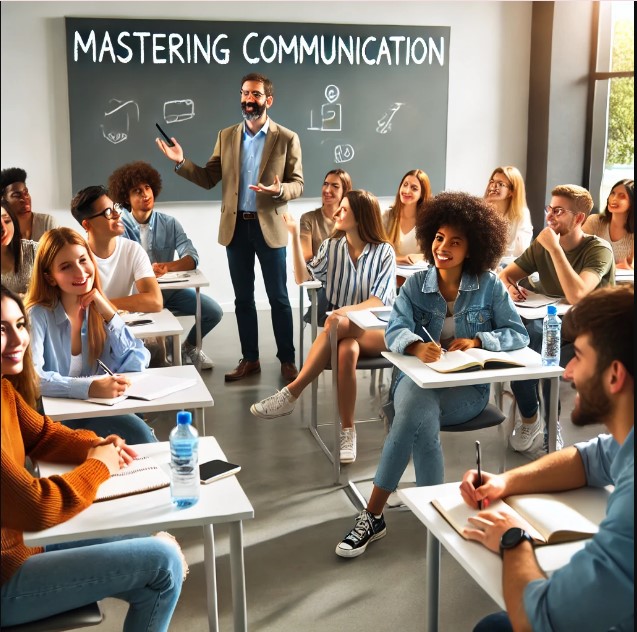Mastering English Communication: A Comprehensive Guide for Professionals
In today’s interconnected world, effective communication is more important than ever. English, as a global lingua franca, plays a crucial role in bridging cultural and linguistic divides. Whether you’re preparing for a job interview, aiming to ace a presentation, or simply looking to improve your day-to-day interactions, mastering English communication can open doors to numerous opportunities. This comprehensive guide will take you through practical steps to enhance your English communication skills, ensuring you speak and write with clarity and confidence.
The ability to communicate effectively in English is not just about speaking fluently but also about understanding cultural nuances, engaging with diverse audiences, and conveying messages clearly. With the digital age revolutionizing how we interact, the demand for strong communication skills has only intensified. This guide will explore various strategies to improve your speaking, writing, and non-verbal communication skills, along with tips for overcoming common barriers.
By the end of this guide, you will have a clearer understanding of your communication style, practical tools to enhance your skills, and the confidence to engage in any setting. Whether you are a student, professional, or someone seeking personal growth, this step-by-step approach will provide you with the foundation needed to master English communication.
Understanding the Importance of Communication

Effective communication is the foundation of successful personal and professional relationships. It facilitates understanding, reduces conflict, and fosters collaboration.
Personal Growth
Clear communication helps in expressing thoughts and emotions accurately, which is essential for building and maintaining personal relationships. Miscommunication often leads to misunderstandings and conflicts, whereas effective communication fosters trust and empathy.
Professional Success
In the workplace, effective communication can lead to better teamwork, increased productivity, and career advancement. Employers value individuals who can articulate their ideas clearly, listen actively, and collaborate effectively with others. Strong communication skills are linked to leadership potential and are often a key factor in promotions and job offers.
Global Connectivity
English is the dominant language in business, science, and technology, making proficiency in English communication a valuable skill in a globalized economy. Being able to communicate with people from different cultures and backgrounds enhances your ability to participate in international markets and expand your professional network.
Conflict Resolution
Effective communication is crucial in resolving conflicts, whether in personal relationships or professional settings. By expressing your thoughts and listening to others, you can find common ground and work towards mutually beneficial solutions.
Innovation and Creativity
Communication fosters the exchange of ideas, leading to innovation and creativity. When individuals share their thoughts openly, it encourages brainstorming and collaboration, resulting in new solutions and advancements.
Assessing Your Current Skills

Before embarking on your journey to improve your communication skills, it’s important to assess where you currently stand.
Self-Assessment Techniques
Record yourself speaking, write essays or journal entries, and seek feedback from peers or mentors. Reflect on your communication experiences and identify situations where you felt confident and those where you faced challenges.
Identifying Strengths and Weaknesses
Focus on areas that need improvement, whether it’s vocabulary, pronunciation, or grammar. Consider taking online assessments or quizzes to evaluate your proficiency in different aspects of communication.
Setting Communication Goals
Establish clear, achievable goals such as expanding your vocabulary, improving your public speaking skills, or enhancing your writing abilities. Break these goals into smaller, manageable tasks and set deadlines to track your progress.
Feedback and Reflection
Regularly seek feedback from others to gain insights into your communication style and areas for improvement. Reflect on your interactions and consider what strategies worked well and what could be improved.
Improve your skills with BBC Learning English.
Personal Reflection
Spend time reflecting on your communication habits and the impact they have on your interactions. Consider keeping a journal to document your experiences, challenges, and successes as you work towards your goals.
Improving Your Speaking Skills
Speaking is a critical component of communication, and improving it requires practice and dedication.
Practicing Pronunciation and Intonation
Utilize online resources, language learning apps, and tools like pronunciation guides to hone your skills. Focus on the sounds that are challenging and practice them regularly. Listen to native speakers and mimic their intonation patterns.
Expanding Your Vocabulary
Read widely, use flashcards, and engage in conversations to introduce new words into your lexicon. Make a habit of learning a few new words each day and use them in sentences to reinforce your understanding.
Engaging in Conversations
Practice speaking with native speakers or language exchange partners to gain confidence and fluency. Join clubs, groups, or online forums where you can engage in discussions and practice your speaking skills in a supportive environment.
Explore Cambridge English for official learning resources
Utilizing Technology
Leverage apps and online platforms that offer interactive speaking exercises and feedback. Use technology to connect with language partners and participate in virtual discussions or debates.
Public Speaking and Presentation Skills
Develop your public speaking skills by participating in speaking clubs like Toastmasters or attending workshops. Practice delivering presentations and speeches to build confidence and improve your ability to articulate ideas clearly.
Listening Skills

Improve your listening skills by actively listening to podcasts, audiobooks, and conversations in English. Pay attention to different accents and styles of speaking to enhance your understanding and comprehension.
Enhancing Your Writing Skills
Writing effectively is as important as speaking, particularly in professional settings.
Understanding Different Writing Styles
Familiarize yourself with various styles, including formal, informal, persuasive, and narrative writing. Analyze samples of each style to understand their characteristics and appropriate usage.
Improve your skills with Duolingo – A popular app for practicing and improving English skills interactively
Structuring Your Writing
Learn to organize your thoughts clearly with a strong introduction, coherent body, and concise conclusion. Use outlines to plan your writing and ensure your ideas flow logically.
Grammar and Punctuation
Pay attention to common grammatical errors and punctuation rules. Tools like Grammarly can provide real-time corrections and suggestions. Study grammar guides to deepen your understanding of language rules.
Editing and Revising
Always review and revise your work to ensure clarity and coherence. Take breaks between writing and editing to approach your work with fresh eyes. Consider peer reviews or professional editing services for additional feedback.
Cambridge English – Official resources for English learning and certification.
Creative Writing and Storytelling
Explore creative writing and storytelling to enhance your ability to engage readers and convey messages compellingly. Experiment with different genres and writing prompts to stimulate your creativity.
Research and Citation Skills
Develop your research skills to gather information effectively and cite sources correctly. Understanding how to integrate research into your writing is crucial for academic and professional success.
FluentU – Engaging videos and lessons to improve listening and speaking skills.
Non-Verbal Communication
Non-verbal cues often speak louder than words and are integral to effective communication.
Body Language
Understand the importance of posture, gestures, and facial expressions in conveying messages. Practice positive body language, such as maintaining an open posture and using appropriate gestures to emphasize points.
Eye Contact
Use eye contact to build trust and demonstrate engagement in conversations. Be mindful of cultural differences in eye contact, as it can vary in meaning across cultures.
Cultural Sensitivity
Be aware of cultural differences in non-verbal communication to avoid misunderstandings. Research cultural norms and practices when interacting with individuals from diverse backgrounds.
Facial Expressions
Recognize the impact of facial expressions on communication. Practice using facial expressions to convey emotions and enhance the clarity of your messages.
Proxemics and Space
Understand the concept of personal space and how it varies across cultures. Respect personal space to make others feel comfortable and respected during interactions.
Engaging in Continuous Learning
Communication is an evolving skill that benefits from continuous learning and practice.
Grammarly Blog – Helpful tips on writing, grammar, and communication in English.
Resources for Improvement
Explore books, podcasts, and courses dedicated to enhancing communication skills. Attend workshops and seminars to learn from experts and gain new perspectives.
Language Exchange Groups
Join clubs or online groups where you can practice with others and learn from native speakers. Participate in language exchange programs to immerse yourself in different cultures and languages.
Regular Practice Schedule
Dedicate time each day to practice speaking, writing, and listening to improve steadily. Set aside specific times for language learning and stick to a routine to build consistency.
Goal Setting and Monitoring
Continuously set new goals for your communication skills and monitor your progress. Celebrate achievements and reassess goals to ensure ongoing growth and development.
Mentorship and Coaching
Seek mentorship or coaching from experienced communicators who can provide guidance and feedback. Engage in conversations with mentors to gain insights and learn from their experiences.
Overcoming Communication Barriers
Communication barriers can impede understanding and need to be addressed effectively.
Managing Anxiety and Nervousness
Practice relaxation techniques and prepare thoroughly to reduce anxiety in communication. Techniques such as deep breathing, visualization, and positive affirmations can help calm nerves.
Adapting to Diverse Environments
Learn to communicate effectively with people from different backgrounds and cultures. Embrace diversity and develop cultural competence to enhance cross-cultural communication.
Handling Misunderstandings
Develop strategies to clarify and resolve misunderstandings when they arise. Practice active listening, ask clarifying questions, and ensure mutual understanding by paraphrasing key points.
Overcoming Language Barriers
Use visual aids, gestures, and simplified language to bridge language gaps. Encourage patience and open-mindedness in conversations with non-native speakers.
Building Confidence
Build confidence by setting achievable communication goals and celebrating small victories. Engage in activities that challenge your communication skills and provide opportunities for growth.
Conclusion
Mastering English communication is an empowering journey that extends beyond language fluency. It involves honing your ability to express thoughts clearly, engage diverse audiences, and navigate cultural nuances with confidence. Whether your goal is personal growth, professional success, or global connectivity, effective communication skills serve as a cornerstone for building relationships, solving problems, and achieving aspirations.
By continuously practicing speaking, writing, listening, and non-verbal communication, and embracing feedback and self-reflection, you can transform challenges into opportunities for growth. Remember, every conversation, presentation, or written message is a chance to improve.
Commit to lifelong learning, leverage the vast array of tools and resources available, and take pride in every milestone you achieve. With dedication and persistence, you will not only master English communication but also unlock new doors to success and fulfillment in every aspect of life.

